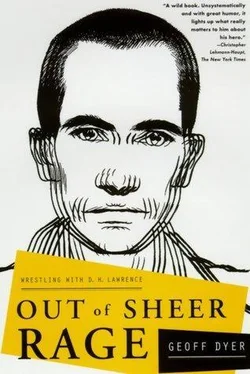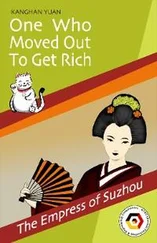‘ Pasaporte, por favor ,’ he said. To get at my passport I had to stand up which was difficult to do without banging my head on the luggage rack — so I stood up very quickly, as if eager to obey, and smashed my head on the sag of cases — not hard enough to hurt myself, just to look ridiculous — and crumpled lankily back into my seat. The woman next to me laughed. The soldier laughed. I rubbed my head, not making a meal of it. Stood up more gently. Handed him the passport which he looked at kindly.
‘ Cuidado ,’ he said, handing back the passport and pointing to the luggage rack. ‘Careful.’
‘ Sí ,’ I said, not smiling. ‘ Gracias .’ The soldier walked back down the aisle, said something to the driver who said something back and they both laughed. Then he got off the bus and waved us on. As the bus rumbled into motion again I had half a mind to open my spectacles case and give the boy-soldier a flash of its fragrant, delirium-inducing contents.
I look back on this as one of the two or three incidents which prove how far I have come in the quest for wisdom. I rank it alongside the time in France when I was on the brink of buying a shirt which was only just big enough, which the assistant assured me would not shrink, but which I knew would shrink (less wisely, I bought it anyway). The episode on the bus confirmed what I had long suspected: the massive advantages of appearing ridiculous. Only those with dignity can ever lose it. Whereas I, ever since that moment on the bus, have behaved with no dignity whatsoever. I can walk down a street in my best clothes and fall flat on my face with no appreciable loss of dignity because I am someone who is, in some sense, already flat on his face, already devoid of dignity.
As soon as we arrived in Oaxaca we took a taxi to see the doctor, a tall American who did not look in the best of health himself. Laura had an amoeba, he explained, and a fever known as ‘the breaker’. In Laura’s fever-dulled eyes there was a brief flicker of pride that what she was suffering from merited so terrible a name. Who knows what she was feeling? Like flu only worse, I suppose. He gave us antibiotics and we checked into a hotel, a nice place run by a family who were always eager to help.
Even when the antibiotics had begun working Laura felt too weak to walk. I sniffed around the city a little but my heart wasn’t in it. How often I find myself using this phrase as I get older: my heart wasn’t in it, my heart isn’t in it. Maybe those are the words that should be on my grave: ‘His heart wasn’t in it.’ I should have sought out Lawrence-related places but my heart wasn’t in it. I was suffering one of those strange losses of purpose that come over one from time to time, that had come over me, in very mild form, in the Lawrence Birthplace Museum in Eastwood. Right on the brink of doing that which you came to do, close to achieving some long-anticipated wish, suddenly you lose interest. It always happens to me before parties. Even if I have looked forward to a party for months, even if I have enjoyed the process of choosing what to wear, still, at some point, minutes before arriving, I find I want to do nothing so much as return home, to stay in and watch TV. It’s not a question of dread or social anxiety, but a strange becalming that leaves one stranded, inert. It happened in Cairo when only a fantastic effort of will dragged me from my hotel to the pyramids which were the things in Egypt I most wanted to see, and in Moscow when I only just managed to get to the Pushkin Museum to see the Gauguins that I had waited years to see. It had happened many, many times but never so catastrophically as in Oaxaca. We had come all this way in Lawrence’s footsteps. We weren’t there to do research, to consult dusty, non-existent archives but still, had it not been for Lawrence we would not have come to Mexico at all; at the very least Lawrence provided the incentive to travel to Mexico, a country I had never had any real desire to visit — and now that we were here, in Oaxaca, a town that was fairly important for Lawrence, I found that I not only had no impulse to seek out the places he had stayed, but was actually incapable of forcing myself — as I had forced myself to see the pyramids and the Gauguins — to seek out these places, places where he had written parts of The Plumed Serpent , a novel which I could not bring myself to read. Not only did I not read The Plumed Serpent but, I find now, I do not like to even think about The Plumed Serpent because it reminds me of that non-time in beastly Oaxaca.
What did I do in beastly Oaxaca? Moped around the hotel, brought Laura glasses of water, asked how she was feeling, hung out in the zócola, went to the market at Central de Abastos and negotiated the purchase of a hammock which I didn’t get round to buying. Killed time, hung out in the zócola, concentrated on not getting ill even though, looking back, it seems to me now that I was in the grip of some illness which was all the more malign for being apparently symptomless. Laura and I discussed what to do, which actually meant discussing what not to do. We decided not to stay in Mexico and not to bother with New Mexico either. All Laura wanted to do was get back home, to Italy, to Rome. I didn’t care what I did so we agreed to fly back to Rome. It was all the same to me. I was becoming indifferent to everything, a feeling which turned out to be an intimation of the deep depression I would sink into back in Rome and which I will talk about later.
This depression was compounded by the way that, back in Rome, I was aghast that I could have squandered my time in Oaxaca so thoroughly. I flung myself into whatever books about Lawrence were around, doing the research retrospectively that should have preceded our trip to Mexico, checking Lawrence’s movements, discovering that he stayed at the Hotel Francia (‘Very pleasant’) and then rented a house at 43 Avenida Pino Suarez (‘Very beautiful’). There was such an abundance of information on Lawrence in Oaxaca it even seemed, for a brief moment, that I could, as it were, overdub my visit to Oaxaca. This hope proved futile. All this frenzied activity was really just a kind of twitching, some last fizzle of energy before I succumbed to terrible depression.
Looking back on our abortive trip to Oaxaca now, writing about our abortive trip to Oaxaca, I am still surprised that I squandered my time there so thoroughly. Although it had been easy to discover that Lawrence stayed at the Hotel Francia it was more difficult to find where we had stayed for a week. A parrot filled the leaf-soaked courtyard with blue and green squawking, I remember that, but I kept no notes, have no record of the name of the place. I’ve looked at the Rough Guide and Let’s Go but can’t find anything that jogs my memory. It is no use; it is gone, lost. Long resigned to lacking the application adequately to research Lawrence’s life I find I am not even qualified to research my own, to be my own biographer.
If one could accept one’s own shortcomings, perhaps one could be happy, contented, at one, as they say, with oneself; but what if one’s principal shortcoming is, precisely, this unlimited capacity to generate friction between giving in to oneself as one is one moment and the equally strong urge to re-shape and seize control of how one was at some later date? Nothing wrong per se in going to Oaxaca and deciding, once you are there, that you do not want to do exactly that which you came to do. It might even be tolerable to fail to do what you came to do and to come to regret it later, but to fail to do something now precisely so that you can gnaw and gnaw away at it later, and then to waste weeks gnawing over this syndrome. . No, there is not even the glimmer of contentment there. You’re stuck, stuck in an endless loop, stuck like a record which keeps jumping back to the same three words — ‘if only. .’, ‘if only. .’ — which turn out to be only two words.
Читать дальше












